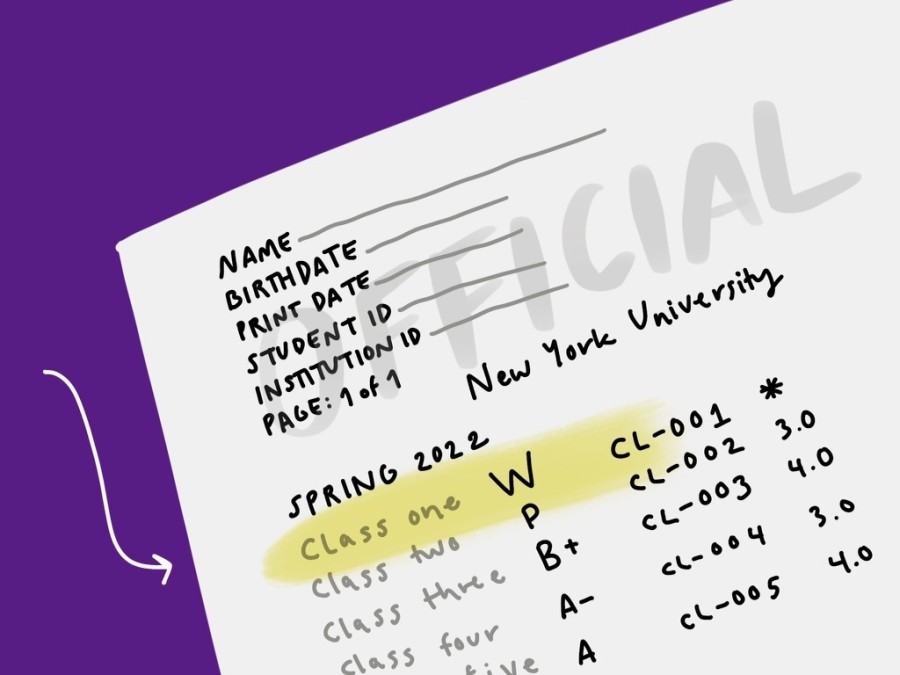Opinion: For students’ health, a W grade on a transcript should be expungeable
The rigidity of the withdrawal policy may push students to prioritize grades over health.
NYU’s stringent policy on course withdrawal incentivizes students to prioritize grades over health. (Staff Illustration by Susan Behrends Valenzuela)
April 13, 2022
If a student withdraws from a course after the add/drop period, a W will appear on their transcript. According to guidelines from the NYU Division of Student Affairs, students cannot be exempt from this mark on their transcripts due to medical exemptions. The problem with this standard is that it implicitly encourages the prioritization of academic excellence over health. After graduation, grades will have little to no effect on a student’s life. However, if a student abuses their health — mental or physical — for these grades, they could be paying for it long after they leave the insulated bubble of academia.
In February, I went home for a few weeks due to a medical issue. I received multiple letters from three medical institutions, which I sent to Student Affairs. One of these letters suggested that I lighten my course work for the remainder of the spring semester. My doctor felt that dropping a class could temporarily reduce stress-induced pain flare-ups.
I returned to school and took my physician’s advice. I dropped a course and got accommodations with the Moses Center for Student Accessibility. My advisers and professors were beyond accommodating, flexible and supportive.
When I did drop the course, however, I quickly discovered that the newly added W on my transcript from unenrolling could not be removed, regardless of the fact that it was there because of a medical issue.
A W on a transcript is not disastrous. It is not as if a single W will seriously jeopardize a student’s future, should they wish to pursue graduate school. However, it also isn’t great. At NYU, a W does not affect a student’s GPA. However, for pre-health students, the College of Arts & Science’s website states that “health professions programs may assume that a grade of W indicates that the student would otherwise have received a grade of C- or lower.” It is important to note, though, that this unfavorable assumption is only a possibility. Receiving a W is not a fatal error, it’s just not ideal.
If the W policy does not adapt to students with medical exemptions, students may feel the need to choose between academic perfection and their well-being. If they have a medical problem, but fear the irreversible stain of a W on their transcript, they may force themselves to take on coursework that is simply too much to handle. This is clearly a recipe for disaster.
Occasionally, academically inclined students will mistakenly equate their grades with their self worth. By this logic, they view the prioritization of academics over health as a kind of allegiance to morality. This may be one reason why some students are so willing to trade well-being for good grades. Encouraging this trade, however, is detrimental to students in the long-run. Eliminating this behavior altogether is difficult and perhaps unrealistic, but reforming the rigid W policy to be more forgiving would support a less cutthroat approach to academic success.
WSN’s Opinion section strives to publish ideas worth discussing. The views presented in the Opinion section are not the views of the Washington Square News.
Contact Sophie Moller at [email protected].





























































































































































